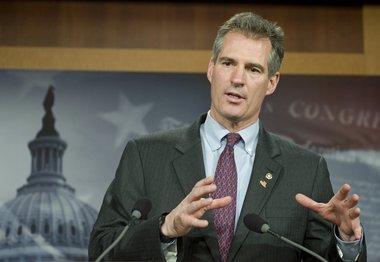By Susan Nielsen
The Oregonian
February 20, 2011
http://www.oregonlive.com/news/oregonian/susan_nielsen/index.ssf/2011/02/a_senators_secret_a_survivor_s.html
 |
| Sen. Scott Brown, R-Mass, during his first news conference as senator in February 2010. |
Scott Brown, a U.S. senator, waited 40 years to tell anyone he'd been sexually molested as a child. The Massachusetts Republican's recent decision to speak out will have two sure consequences, if his experience is like those of other victims who've faced the dragon and gone public.
He'll risk skepticism and ridicule. In fact, the backbiting already has begun, just a few days after the first news accounts of his disclosure. But he'll also shrink the stigma of sexual abuse a tiny bit more -- simply by showing that bad things can happen to anyone, including boys who grow up to be senators.
Brown discusses being sexually molested by a camp counselor and physically assaulted by a stepfather in an unsparing new memoir, which will be released Monday following an interview Sunday evening on "60 Minutes." In published excerpts, Brown portrays himself as let down by the adults closest to him, then saved by a few caring teachers and a judge. He found salvation in basketball and, eventually, law and politics.
It's a classic political tale of overcoming hardship, but with the type of details usually found in lawsuits -- grooming, threats, shame, anger, juvenile delinquency. Despite the difficulties, Brown makes clear that he is resilient, unapologetic and determined to have a happy ending.
"Like a fractured bone," Brown writes, "I have knit back stronger in the broken places."
Though the public reaction to Brown is largely positive, a skeptical undercurrent about his motives is unmistakable: Why now? Is this a political move to curry favor with voters? Was his childhood really that bad? The questions are far more restrained than with Lara Logan, a CBS journalist who was mobbed and sexually assaulted (then criticized for it) while covering the recent protests in Egypt, but they persist nonetheless.
I have no idea about Brown's motives or the exact circumstances of his indisputably tough childhood. What I do know is that courage begets courage. As we've seen in Oregon, survivors who share their experiences inspire others to do the same -- and they teach the public to be smarter about prevention and more clear-eyed about crime.
One of the most prominent local examples is Tiffany Edens, an Oregon woman who was attacked as a Portland teenager by a serial rapist. Her decision to speak out publicly a few years ago, and lobby against the rapist's early release from prison, compelled several of the rapist's other victims to come forward by name in solidarity.
These women, in turn, led a retired Portland teacher to confront local Jesuit leaders in 2008 and report being raped three decades ago by a well-known Jesuit priest. The church investigated the teacher's complaint, found it credible and apologized. Though the teacher didn't want her name used publicly, she did say that the bravery shown by the rapist's victims -- Tiffany, Danielle and the many others -- bolstered her strength.
Other recent Oregon examples include Kerry Lewis, who successfully sued the Boy Scouts of America for abuse by a troop leader, and Jeff Elizalde, who says he was sexually assaulted decades ago by a staff sergeant while serving in the Marines. In both cases, these men put a much-needed human face on problems typically discussed in the abstract.
On Friday, officials from Brown's former summer camp sent a letter to the parents of current campers. It addressed the allegations and asked parents to be mindful of the dangers that children can face at the hands of trusted adults.
"Forty years ago when Senator Brown was a camper, there was far less awareness and greater stigmatization around abuse, which kept many children suffering silently into their adulthoods," the letter said, according to the Boston Globe. "Sharing personal experience is more common and accepted now. These public disclosures can serve as an important reminder to all of us that child abuse is real and needs to be seriously addressed by any agency taking care of children."
That letter never would have been written without Brown's decision to stand up and be counted. Brown's level of public disclosure is neither possible for every victim, nor should it be expected of those who may need privacy above all. But whenever a survivor is able to speak out, from whatever position of power or obscurity, a small measure of justice is done.
Any original material on these pages is copyright © BishopAccountability.org 2004. Reproduce freely with attribution.